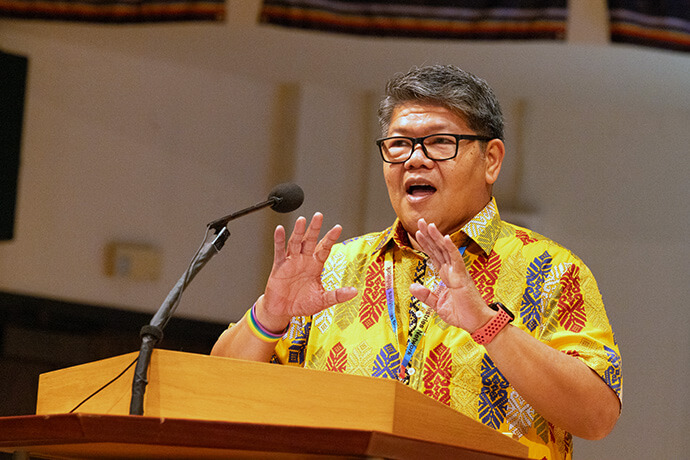
This year’s Reconciling Ministries Network Convocation saw the largest amount of international participation since the group began periodically holding such gatherings in 1987.
United Methodists from both the Philippines and the African continent were among the speakers as well as guests.
That’s the kind of relationship-building the network’s leaders hope to see going forward. The strengthened ties come even as the denomination’s central conferences in the Philippines and Africa have used their authority under the denomination’s constitution to keep bans on same-sex weddings and gay clergy within their borders.
At the same time, the Philippines Central Conference delegates approved two resolutions related to creating sacred space within the central conference for the LGBTQ+ community.
Jennifer Ferariza-Meneses told Convocation participants that the two resolutions, submitted by women in the conference, "represent our continuing commitment to build a more inclusive, just and compassionate church."
One resolution encourages developing and promoting ministries and resources that educate congregations and church leaders about welcoming the LGBTQ+ community. The other defends the basic human rights of LGBTQ people.
The Rev. Israel “Izzy” Alvaran, the network’s director of United Methodist connections and a native of the Philippines, has been taking the lead in the network fostering relations across national borders.
He also has been leading the group’s advocacy for regionalization, a package of constitutional amendments that will transform the denomination’s eight central conferences and the U.S. into regional conferences with the same authority to adapt church policies. That means regional conferences in Africa and the Philippines can keep their bans while regional conferences in Europe and the U.S. may vote to affirm LGBTQ people.
Regionalization — first proposed by central conference delegates working for church unity — is now before annual conference voters who will determine if the amendments are ratified.
In the meantime, Alvaran explained why Reconciling Ministries Network supports regionalization.
He recognized that LGBTQ people will continue to be born all around the world.
“What regionalization allows is for us to support them in the wholeness of who they are as human beings, and not in a colonial way of imposing,” he said. “Also, regionalization expands our notions of conversation around inclusion to include racial justice, misogyny, hunger, peace and violence, and health care justice.”
Regionalization, he said, does not stop the conversation but keeps it going with United Methodists around the globe relating to each other on more equal footing.
Return to main story, LGBTQ advocates head for ‘uncharted’ territory
Hahn is assistant news editor for UM News. Contact her at (615) 742-5470 of [email protected]. To read more United Methodist news, subscribe to the free UM News Digest.
